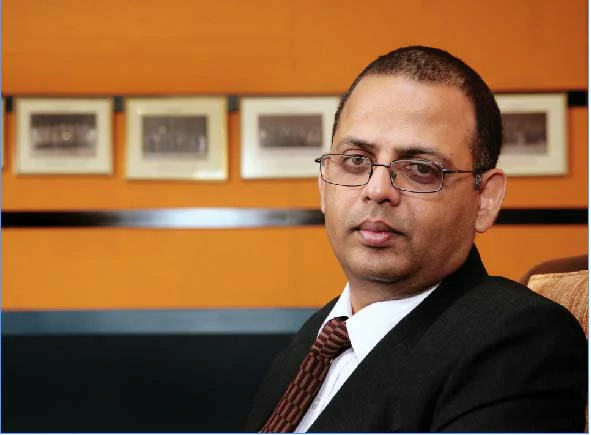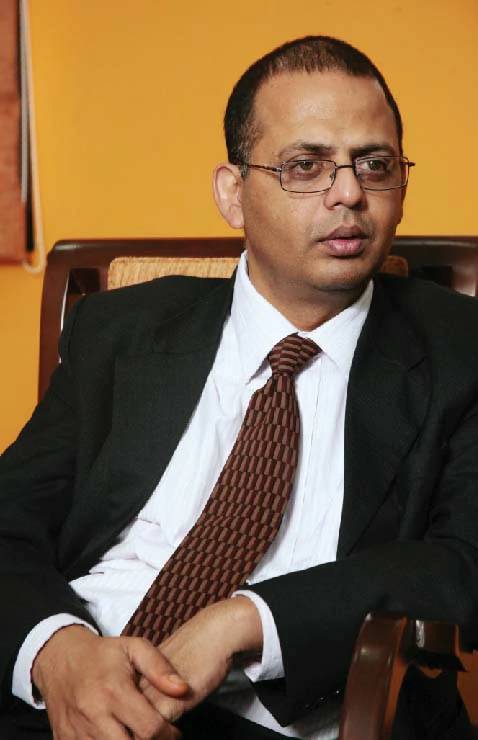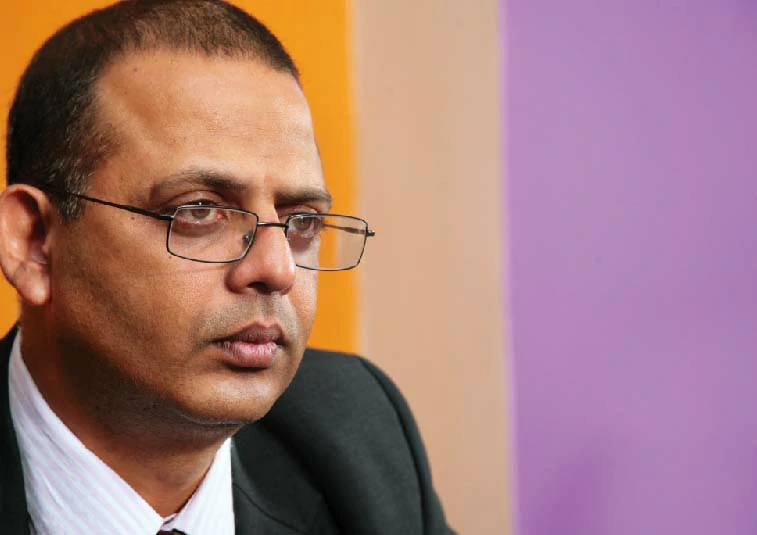
The global economy is currently facing one of its toughest challenges. due to the resultant pressure, a number of banks and businesses have collapsed in many areas of the world. However, the underlying fact remains that the exit of certain businesses are healthy for the economy. Fraud, Risk management, co-operate governance and the role of the CFO are terminology regularly discussed. Ravi Raman, The chief risk officer of butterfield fulcrum was in Srilanka recently on the invitation of the chartered institute of management accountants (CIMA)as the guest speaker at the CIMA-CFO Forum;history repeats-the satyam debacle and the lessons for the CFO’s held in colombo. He sat down with busines Today to shed light on the many aspects of the current economic environment.
By Udeshi Amarasinghe | Photography by Sanka Sammana
In common terms what is Risk Management?
Risk Management has evolved over the years. During each period, the focus was on the issues that were relevant to that era. If you ask me about 500 years ago, that is before the Industrial Revolution, Risk Management always meant fire and flooding risks. This was the time when people started living together in houses close to each other. But when the Industrial Revolution came about and factories were built, the focus was on industrial safety and associated issues. Following industrialisation when trade was the main focus, Risk Management meant insurance. For example, the East India Company coming to India was all related to trade and insurance. In fact the idea of a joint stock company with limited liability was created in London to make sure that people participated in this voyage of trade. The model was that if the voyage makes profit, the investor will get the benefit, but if the voyage incurs losses, then they lose only the money they have invested. The trade companies needed so much capital and Risk Management created the idea of a joint stock company at that time. In fact, London is still considered as the capital of global insurance. Till about the 1970s, Risk Management was all about insurance. Then everyone started saying that Risk Management is about compliance. In the 80s and the 90s, more importantly during the Internet era, Risk Management meant Internet security. Then in 2001, after the ENRON burst, Risk Management meant corporate control and regulatory control. Therefore, risk management has undergone a change. One important thing at all points of time is that, Risk Management has always been the core of the businesses in all periods. So Risk Management reinvented itself after each cycle of failures. Risk Management is everything about how enterprises run, how it communicates the potential for failure and how it takes remedial action.
Considering what you have said, why do you think that many businesses are collapsing these days?
Businesses have an inherent attribute to succeed or to collapse. Businesses have to exit from the market in any free market economy when they are not relevant and when they are not competitive. So one of the important things to remember is that if you are going to protect companies and industries that are set to “go”, it can only be done for a limited period of time. You cannot save the US Banks’ $1 trillion without correcting the inherent reasons for failure. Therefore, Risk Management comes into play to ensure that failures are not repeated and also sensitise people on the need to prevent these root causes from repeating. However, despite Risk Management practices being there, right across the world, there will still be failures, but Risk Management helps to mitigate its impact and helps people to know how to look for potential failures.
Risk Management awareness can prevent failures by reminding people of past mistakes but that doesn’t mean there will never be a failure. There will be new and different failures. Therefore, Risk Management processes need to continuously evolve. Five years ago, when I started my life as a Risk Manager for Infosys BPO, Risk Management meant something else; today it is totally different. So Risk Management is evolving and we are doing well today.
The global economic climate has resulted in large institutions such as Lehman Brothers and AIG collapsing, can you tell us how this came about and could it have been prevented?
Could it have been prevented? I would say yes. The mistake that was made here was that bankers relaxed the fundamental requirement of the credit processes – ability to repay – and that too for a sustained period. Starting from 1999 to 2008. People were borrowing money under a very low interest rate regime without any regard to their own capacity to repay. President Barak Obama says even today, “if you have a system where everything is about borrowing, then you are going to have a problem”. In the eastern part of the globe, we say you can’t spend beyond what you earn and this in my view has prevented such catastrophes. Therefore this crisis we are having is that most developed economies and countries are spending beyond their means. In the US, the average savings was minus 3%, whereas in this part of the world, the average savings is more than 35%. There have to be household savings, you can’t have a spending economy. The failures of these banks are truly a failure of their credit processes. The failure of credit processes was also compounded by the fact that all the loans were moved out in the form of securitised debt with low regard for the performance of the loans. In India and Sri Lanka, there has been a tendency to over borrow but that has been restricted to the urban elite exposed to the western way of life. The common man has not been bitten by the “credit” bug. That is great. However, countries like India and Sri Lanka should be watchful when securitisation happens and credit becomes available “free”.
In The US, The Average Savings Was Minus 3%, Whereas In This Part Of The World, The Average Savings Is More Than 35%.
How do you see the economic crisis that has hit the Western world affecting the Asian region?
It has already affected India. There is an impact on trade and employment. That’s why the GDP estimates have been revised. With regard to the impact on employment when the primary employment is hurt, it affects secondary employment as well. Definitely an economy like India is less affected by this crisis, primarily because of their very prudent banking regulations. That is why after the 1994 bank collapses in the Far East including Malaysia, India was safe. It is safe today. I think the conservative, prudent regulations have helped India.
Do you think government interventions should be more prevalent in economies?
Economies that are based on the free market concepts – as advocated by the economists of the early 20th century like Keynes unfortunately are badly hurt now. This is not because the idea of free market is not correct. The scenario we see is that there is no place in the world where the market is “free” and there are always monopolistic tendencies and therefore, the government has a role to play. The governments and the regulators always need to play a very strong role and that is what has happened in India, which has saved the banking system. The government has a very important role in regulation; more importantly the enforcement of regulation. At the same time, governments should not take liabilities on behalf of the companies because I don’t think government assistance can run on a sustainable basis. We cannot have a model where the profits are private but losses are public.
In the UK and USA, the governments stepped in to bailout the banks and companies that were affected by the crisis. Considering what you have said above, do you think that was appropriate action?
Considering the situation that they were in, it couldn’t be helped. The governments in those countries couldn’t allow such a large number of people to lose their jobs. It was also feared that the failures of more banks will lead to the collapse of the international financial system. However, the point is that bailouts being paid are looked upon as a reason for taking control over these companies. In my view, governments shouldn’t run the banks but the government has to regulate the banks. In the USA, we are moving to a position where governments own AIG etc. But I don’t think it is the role of the government to run a business. We are unnecessarily running from one end where industries have been nationalised like in Russia to capitalist countries where they say that the public should be the shareholders. USA is currently swinging to the other end. This will always happen in a period of a crisis. The pendulum will swing and it will come back, the comeback position will be a free market, competition well regulated by the government.
If Creditors Are Giving Monies To The Company At High Interest Rates, I Don’t Believe They Deserve Any Sympathy When The Company Goes Bust.
How would you see the global economy coming out of this recession?
Honestly, I don’t think anyone has a clue, but personally, if you ask me, the whole system will clean itself up. Once the root cause, which is the excessive credit driven society in the US with negative savings, changes its behaviour, the system will begin to stabilise. Will that take a long time? About 5 to 10 years? The answer is yes. However I feel that President Obama is talking the right language, saying, “I have to see our behaviour change”. Invest in education is what he is saying. We have to make sure that we save. It is going to take a long time but at the same time there can still be revival. There has to be a sustainable process and this credit driven economy has to be curtailed.
How do you feel the BPO industry has been affected by such events?
In India, the BPO opportunities are growing because the US corporations do not have a choice other than to outsource. I think it is a clear system where India offers efficiency and excellence, there is no company that can keep out of it. At the same time on an individual basis, some companies will break and will not be able to outsource. That’s fine, it is a natural thing that will happen and we need to accept that.
Considering current events in the business world, what is the role of a CFO in a com-pany?
The role of the CFO is very simple. He is an employee of the company, not of the shareholder. He reports not only to the CEO but also to the auditors and Independent Directors. He is accountable to the Board as well as the CEO. Above all of that, he has to be accountable to himself. Therefore, a CFO cannot get away from anything.
The CFO needs to establish financial control and have full disclosure at the appropriate time, putting in place parametres so that the company knows its limits. The CFO needs to take a decision whether to continue with the business or not. I feel the days are gone where businesses are run with huge losses for a sustainable period and without explicit clearance from the shareholders and the Board. Therefore, it is the CFO’s role to put in place controls. The CFO’s role is to make the right disclosures and assist the decision making of the Board, CEO and shareholders.
Fraud is something that we see more often, not only in the West but also in India and Sri Lanka. What is your view on this and can you tell us a little bit about the responsibilities of each tier of a company, from shareholders to the CEO?
Let me first summarise the principle. Each player whether it be an employee, creditor, CFO, CEO, shareholder or an independent director, has to know their role vis-à-vis the company. Once their role in the company is well established, there will be less difficulty for the individual. As I said before, the CFO is accountable to the company, to the directors and the CEO. The shareholder’s job is nothing more than ensuring that the company gets the right mandate to run and appoint the right managers. Beyond that they do not have a role. The shareholder’s role is only to say, “ok this team is not good enough” or “we need a better team so that we can run this company better”. Then coming to the employees, their main role is to be loyal to the company and execute their job according to their Key Performance Indicator. If anyone tries to do something beyond this and gets into trouble, I will not excuse them for that. If creditors are giving monies to the company at high interest rates, I don’t believe they deserve any sympathy when the company goes bust. In such instances the depositor is making a mistake (if there had been full disclosures). He also has the responsibility to be diligent before he makes an investment.
What do you think motivates people to invest in high return, high-risk ventures? Could their motivation be greed?
Greed is a value statement. I call it “irrational hope”. All of us are greedy and there is nothing wrong with that. However the question is, are you rational or are you irrational? We have a sense of hope when we think that we won’t fail or that we will get out before things fail. Far more than all of these is, the false sense of hope that the entire commu-nity tries to create. By saying “when you lose your money, we will come and pat on your back and say that you are a poor investor and I will go and fight for your money with the Central Bank, to compensate the money that you lost through your greed”, we are en-couraging further irrational investments. We need to get out of this patronising culture. I think it is important for people to know, that if they make a speculative investment with good disclosures, they are bound to lose. It is another matter if there are no disclosures. Do we leave our houses without locking the door? No we don’t. But when it comes to lending money to a company paying an interest, which is well beyond the capacity to repay and the growth that the company can sustain, we don’t take any notice. We should stop giving that sense of hope to people. In fact we are actually penalising companies that are running well and paying low interest; nobody deposits with them, nobody enables them to grow. Fraudulent companies take the money and run away. Therefore, in my view, we have to stop giving this sense of hope. Only thing the regulators can do is ensure that there is adequate disclosure and stop with that. Anything beyond that is not the business of the regulator.
What Is More Likely To Happen In Developing Countries, Is That People Would Say, “Don’t Allow My Bank To Go Down, Because If I Do, The Whole Country Will Go Down”… We Need To Get Out Of That Mentality.
What is the role of the auditors in such instances?
The auditors have a very clear responsibility to look beyond what is given to them by the company. They have a responsibility to inquire. They have to ensure that the controls are in operation and are in place. Having done all of this, if it still escapes them, then I can excuse an auditor. If losses of such a scale (as in Satyam’s case) happen, then I don’t think the auditors should be excused. The second thing is there is no reason for us to panic, when one company fails because of a fraud due to the fault of a few audit personnel is not a crisis of auditing. Unfortunately the audit world is taking it as an accusation towards them but it is not. It is about wrong practices. We do not need to defend the whole auditing profession because of the mistakes of a few.
Could the collapse of such large companies in a country cause an entire collapse of an economy?
One good thing that has come out of the recent collapses is that the distinction between big and small is gone. Previously when small companies failed, they put the officers into jail etc. But one always thinks that once you have grown beyond a certain size, you are safe. That has gone. With the crash of Lehman Brothers, the enigma of big is gone. In that sense, it is a great thing that has happened. Having said that, all these collapses will have an effect on all the shareholders including the economy. What is important is to isolate the root cause and act on the root cause instead of covering it up which is luckily what has been done in India. When something happens, don’t cover it up, go and audit every single company and make sure the same doesn’t happen elsewhere. Will such events affect the economy? The answer is yes. But what should we do? We should allow such companies to continue to collapse but make sure that the same mistakes are not repeated.
For a developing country like Sri Lanka, the impact of collapses of large companies would be very big. What are your thoughts on that?
Definitely. What is important is that companies cannot claim immunity stating that they are big. What is more likely to happen in developing countries is that people would say, “don’t allow my bank to go down, because if I do, the whole country will go down”. This is akin to a terrorist keeping a gun to an innocent man’s head and saying, “if you do anything I will kill him”. We need to get out of that mentality. If it is a fraudulent bank, it should be corrected. If we stop the collapse today, it will collapse some other day and when it does, the economy has to face a bigger problem. A country needs a clean banking system and you need a corporate with good disclosure practices. That is all a country like Sri Lanka needs because it has good intellectual capacity.
It is only during a crisis that such terms as Corporate Governance and Independent Di-rectors come up, don’t you think this is something that should be there throughout?
Corporate Governance is normally understood as a regulatory expectation. Corporate Governance is about running the company as an independent entity – making complete and timely disclosure at all points of time. Corporate Governance is about building companies and groups with strong values and ethics. After that come the processes of whistle blowers and processes of Independent Directors, audit committees and all of that. Before that we need to understand that Corporate Governance is not about compliance with the law. Today when someone talks about Corporate Governance, it is only to meet the expectations of the public. It is only to fulfill the needs of the investors. It is not to build a company with strong values. In my view, today is the wrong time to talk about Corporate Governance. Today it is a time to talk about pride and reconstructing Sri Lanka. Taking employment to the people. I repeat, today is not the time to talk about Corporate Governance.
Why do you say that?
Today people talk about Corporate Governance as a response to fraud. Whether you have good Corporate Governance or not, you cannot undo fraud nor can you prevent fraud. Fraud will always be there. If there is a fraud it doesn’t mean that Corporate Governance will answer it. The point is, you need Corporate Governance to build an economy, a system, a country and industry. This is what happened in India.
What about Independent Directors?
Independent Directors are always a strength to a company. What is important about the Independent Directors considering the events of the recent past is that they need to create methodologies and mechanisms to have an independent team, which works with the organisation on disclosures and transformations. Coming to an audit committee meeting with data received one week in advance is not enough. There is a need for Independent Directors to be more involved in operations though not intrusively. Therefore, they will have to have a methodology where the CEO and CFO have a team of internal auditors who report to the audit committee independently.
There are many people who are committed and willing to be independent. If you want to have a crony as an Independent Director, yes, you can go ahead and appoint. If the Independent Director is appointed to fulfil legal requirements, then they will do whatever you want. But, if you want the Independent Director to add value to your Board and that is what the shareholders should look for, then that Independent Director will be actually independent. Today the shareholder is not giving that message. Shareholders are appointing Independent Directors who the CEO is comfortable with. The Independent Director’s role and responsibility is to safeguard the shareholders, nothing else. Therefore the shareholders should appoint who is good for them.
Whenever there is a failure, people would say that the regulators are responsible. I’m saying no. It is a collective failure and a collective responsibility. Therefore, we need collective action.
It Is Very Important To Understand The Strengths Of The Sri Lankan Economy. The Core Strengths Are Education, Integrity And The Good History Of Enterprises.
Finally to end on a positive note, what do you think, the way forward is?
It is very important to understand the strengths of the Sri Lankan economy. The core strengths are education, integrity and the good history of enterprises. Another company may go down tomorrow but there have been so many businesses that have succeeded in this country. That is our strength. I came here in 1995. Within two years, the Sri Lankan Stock Exchange was fully-automated. There are so many capabilities in this country. It is important for Sri Lanka to fully integrate with the world and more importantly with India. I’m not saying this because I’m an Indian but Sri Lanka has much to gain from its close proximity to India. India is going to become the fourth largest economy in the world. Work closely with India because India works very closely with the world, the world cannot do without India, India will also work with Sri Lanka. Prosperity can happen only when there is a good business environment that is focused towards Corporate Governance. National pride is more important now. I’m sure that with the educational capital that is available here and more importantly the great heart of the people, Sri Lanka can do wonders. Sri Lanka doesn’t need to be worried about small things like the failure of a few companies and groups.








